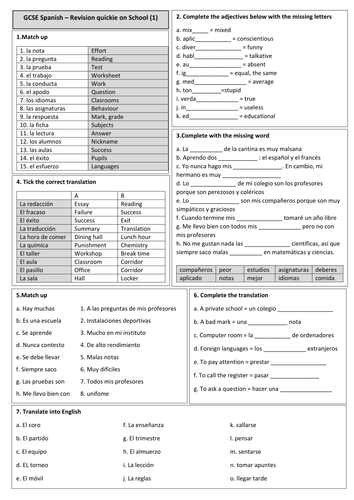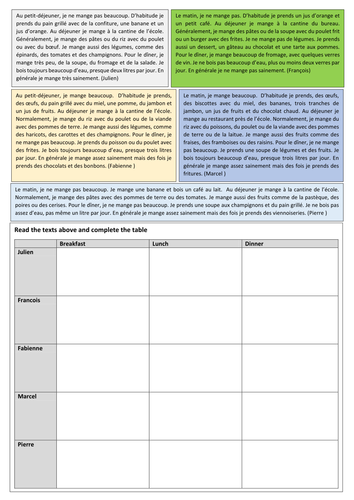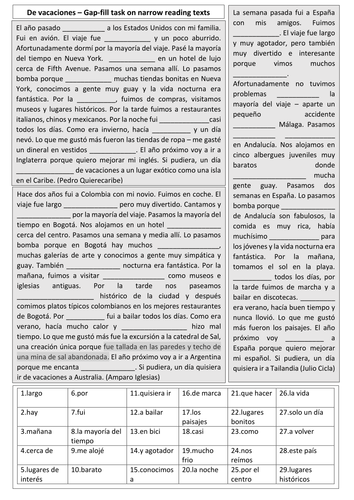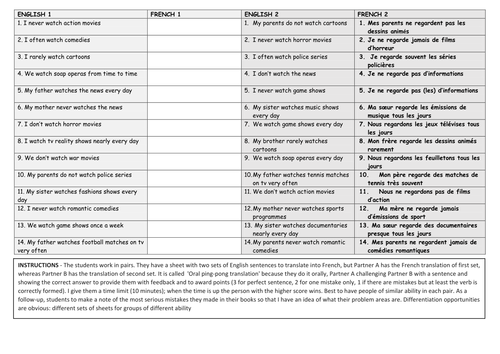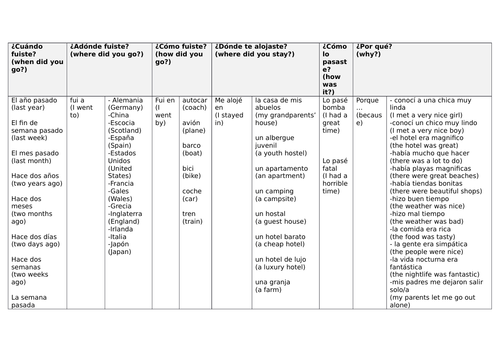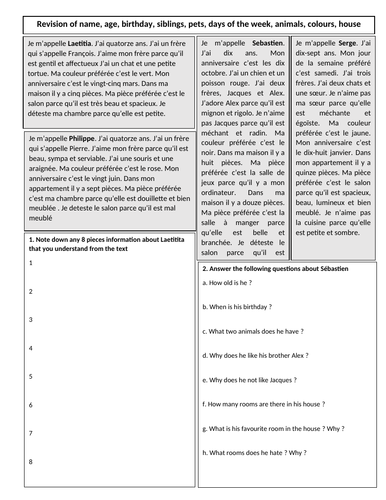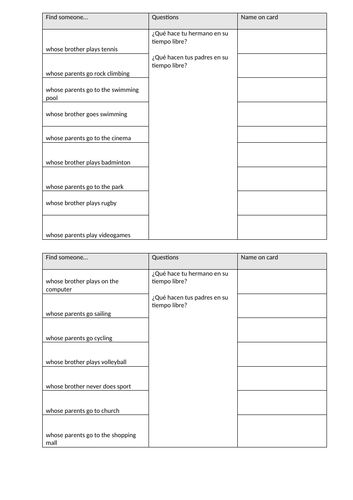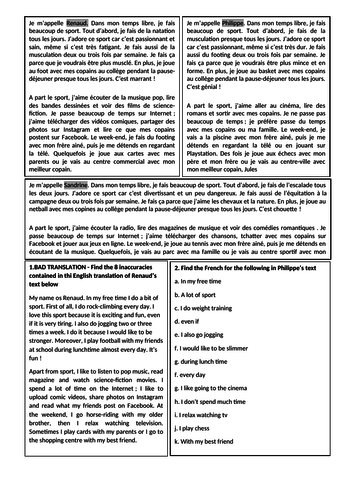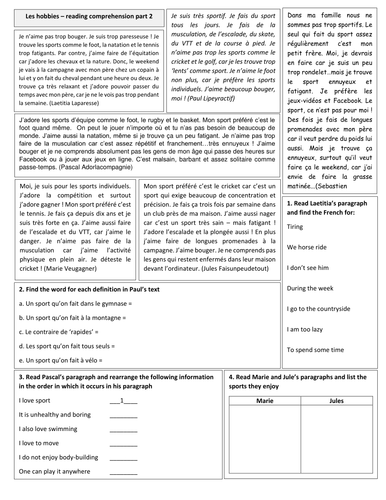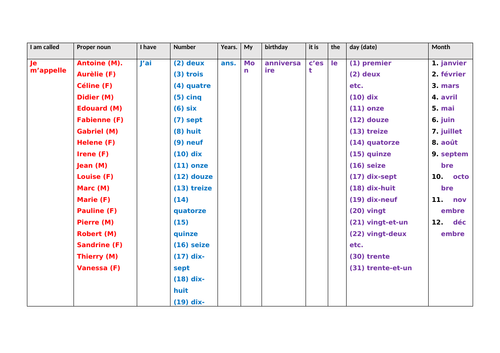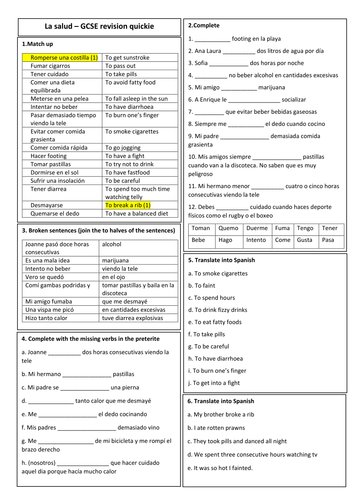
383Uploads
3148k+Views
5746k+Downloads
All resources

GCSE Spanish revision quickie (2017) - Talking about cinema with solution
Three files:
a. Revision worksheet
b. Solution
c. Vocab list to use as scaffold

GCSE French revision revision quickie – Small function words (with SOLUTIONS)
Covers all sort of small function words students of this level find troublesome (prepositions, demonstratives, relatives and others)

Beginner French - Narrow reading texts on food
A set of narrow reading texts on food with a comprehension activity

Year 7 / 8 French - Oral board game on high-frequency school-related phrases
Instructions: In groups of three students (2 player + 1 referee) or five (2 teams of two players and one referee), players take turn in casting the dice. Whichever case the player/team reach based on their dice score, they will have 30 seconds to translate the relative sentence(s) into French orally. The referee will then tell the players (with the help of the answer sheet) if their translation is correct. If the translation is correct they will have another go and casting the dice and will advance to the next case where they will have to translate the next sentence and so on. However, if their translation isn’t correct, the referee will read to them the right version twice in order for the players to attempt to memorize it for the next round when they will have another go. After the opponents’ turn the player will have another chance at casting the dice; if they answer the question they originally got wrong correct. The person who is closer to the finishing line ten minutes into the game will win.

Year 7 / 8 French - Oral ping-pong translation game (pair-work)
INSTRUCTIONS - The students work in pairs. They have a sheet with the same English sentences to translate into French, but Partner A has the translation of sentences 1 to10, whereas Partner B has the translation of sentences 11 to 20.
I call it 'Oral ping-pong translation' because they do it orally, Partner A challenging Partner B with a sentence and showing the correct answer to provide them with feedback and to award points (3 for perfect sentence, 2 for one mistake only, 1 if there are mistakes but at least the verb is correctly formed). I give them a time limit (10 minutes); when the time is up the person with the higher score wins. Best to have people of similar ability in each pair. Here is an example: I made for a very able year 11 of mine. Obviously the activity can be done in writing too.
As a follow-up, I get the students to make a note of the most serious mistakes they made in their books so that I have an idea of what their problem areas are. Differentiation opportunities are obvious: different sets of sheets for groups of different ability

KS3/4 Spanish - Talking about a past holiday pool of resources (reading, speaking, writing)
Three narrow reading texts on talking about holidays with a number of tasks aimed at maximising exposure to the target vocabulary and structures
3 files :
1. Narrow reading texts with three tasks on them
2. Same texts have been gapped and missing words/chunks provided in random order
3. Written and oral work - or simply oral work
4. Oral translation board game
5. Oral scaffold

KS3/4 French - Oral scaffold for conversation on TV, narrow reading and oral ping pong translation
1. Talking mats (10 questions about tv habits) + narrow reading including three tenses
2. Oral ping pong translation

KS3/4 Cinema - Talking about movies (sentence builder, sentence builders and reading comp)
A pool on resources on cinema

KS3 Spanish - My past holidays (pool of resources)
A sentence builder to present basic sentence in the first person
A Survey for oral pairwork
Two worksheets to consolidate the target chunks
An oral translation board game with answer key ( two players and one referee with the answers
Narro reading tasks
Find someone who with cards

KS3/4 Spanish - Talking about hobbies in the preterite (all persons of Hacer, Ir and Jugar)
Old school drills, oral activity and vocabulary work on hobbies in preterite (all persons)

KS3 French - Pool of resources on present of -ER verbs
A sentence builder, a translation board game and some consolidation drills on -ER verbs + hobbies

French Beginners - Narrow reading texts revising name, age, birthday, siblings, pets, days of
Revision of name, age, birthday, siblings, pets, days of the week, animals, colours, house

KS3 Spanish -Pool of resources on hobbies (present tense)
reading-to-write resources, oral games, grammar drills, sentence building and vocab building. All recycling the same chunks and patterns

KS3 French - Reading-to-write sequence on hobbies
A reading-to-write sequence I have designed for my year 7s top set, starting off with a narrow reading tasks set and ending up with a writing tasks. Tasks include: gap-fills, match up. translation. The sequence is carefully scaffolded and graded to enable the students to carry out the task without external help. Lots of recycling of the same syntactic patterns and chunks.

KS4 French - Two reading comprehensions on family relationships
Fairly challenging texts with two pages of tasks. A very good vocabulary range

French - ETRE, FAIRE et ALLER in the Present Indicative (verb builder)
An intensive verb builder designed to drill in the present of these key verbs

French - Name, Age and Birthday. Pool of 12 resources (all persons)
Telling someone your name,age and birthday :
3 sentence builders one modelling first person, one modelling third person sing use and one covering all persons of AVOIR and possessive adjectives
3 vocab building worksheets consolidating all the vocabulary + the verb AVOIR in all persons
Speaking game: Find someone who (cards to cut up and cards)
Speaking game: Oral ping pong to practise all forms of AVOIR + age
Reading : 2 narrow reading texts wih relative tasks focusing on meaning, grammar accuracy and spelling

KS3-4 French : Narrow reading texts and tasks on pollution
A set of six narrow reading texts and relative tasks on the theme of pollution. This resource would be used at the beginning of an instructional sequence on talking about issues in one’s town/region. Lots of recycling of the same key patterns. Ideal for homework, cover work but can also be used for consolidation, as a pre-listening activity or before engaging the students in a basic writing task

GCSE SPANISH REVISION (2018) - Four Revision Quickies on Health and Lifestyle
4 word documents packed with vocab building activities teaching useful language chunks through deep semantic processing tasks

